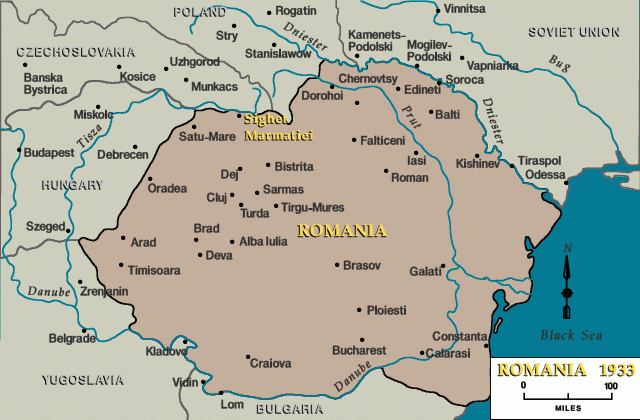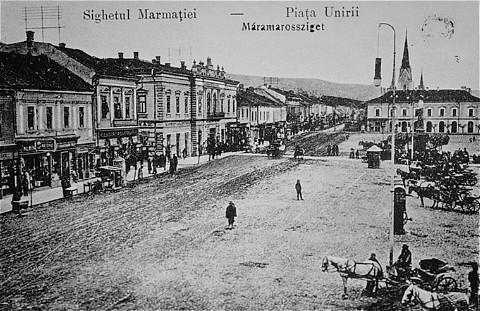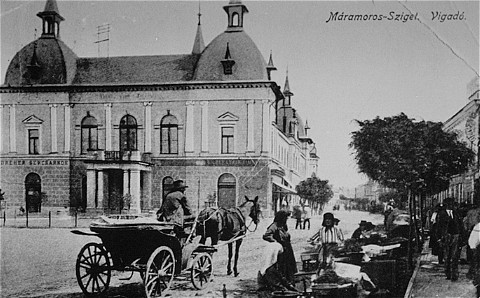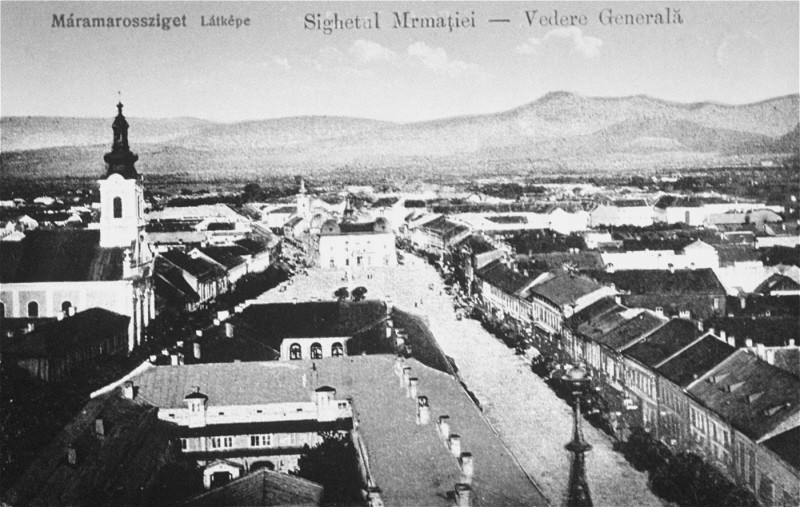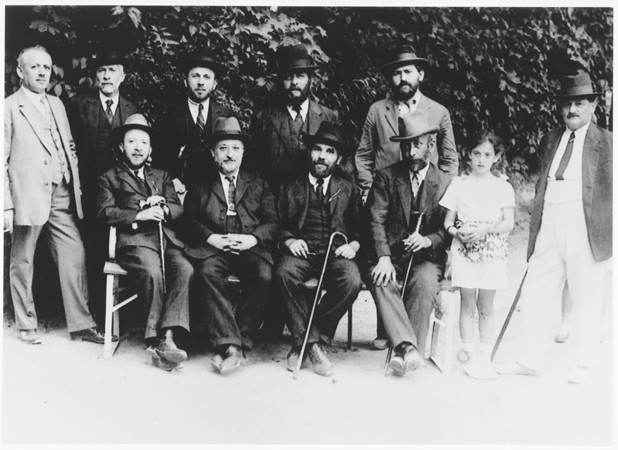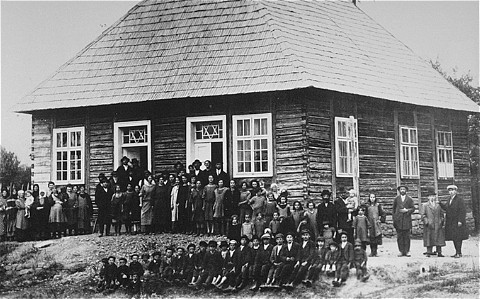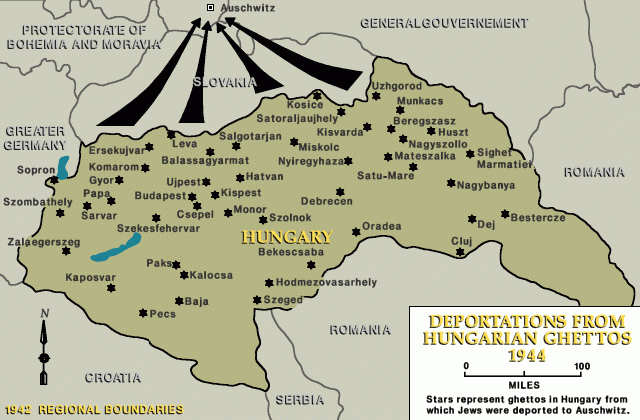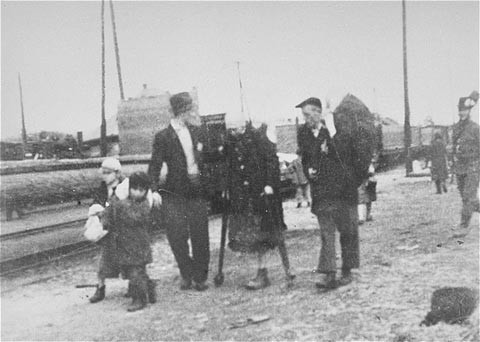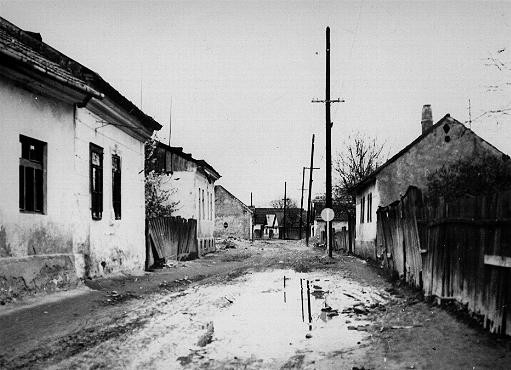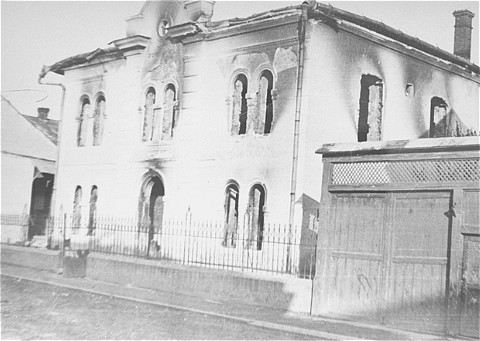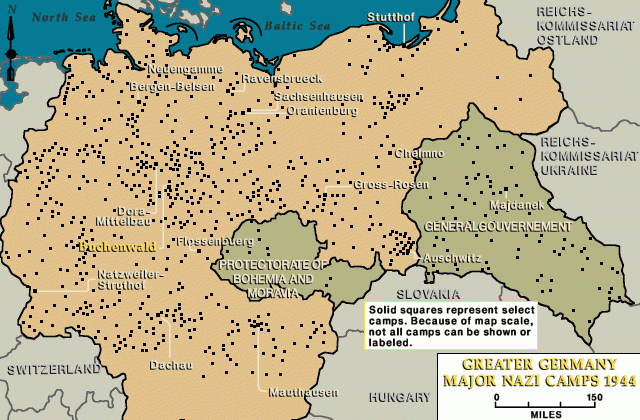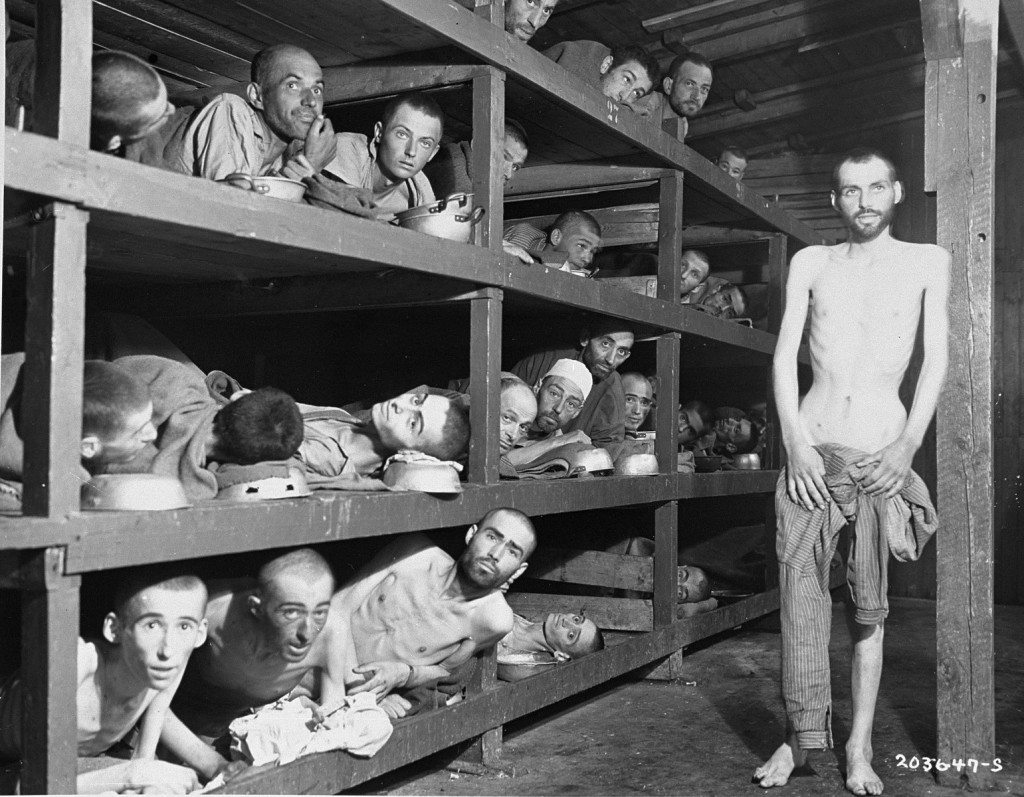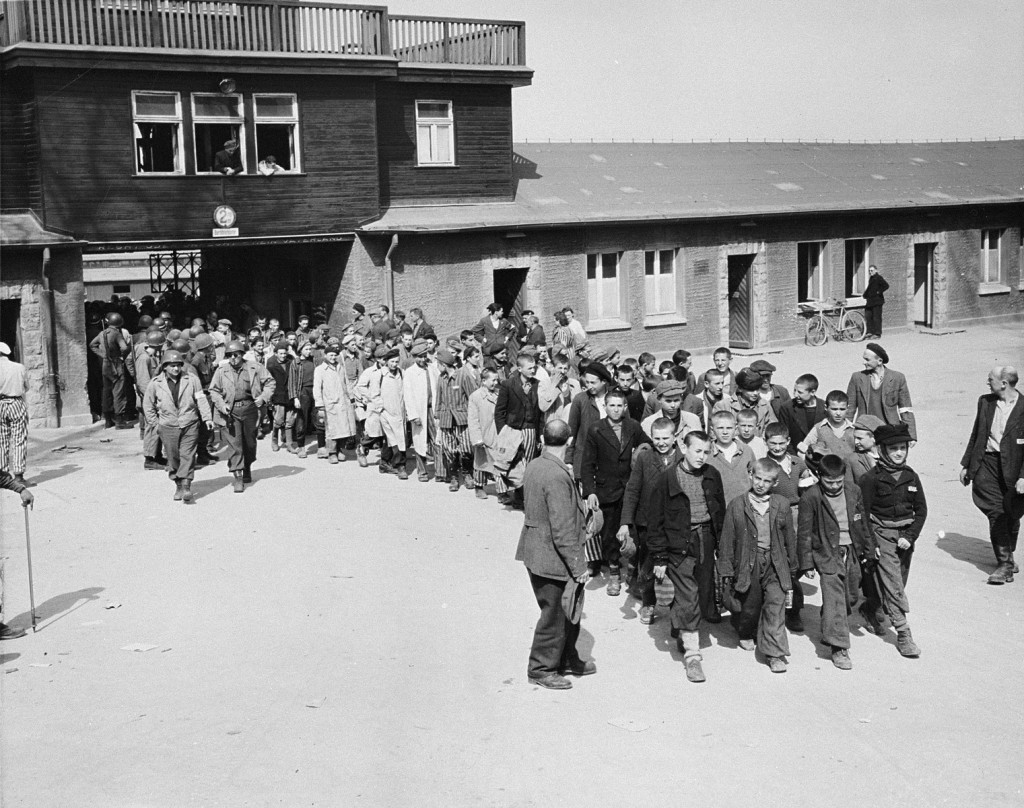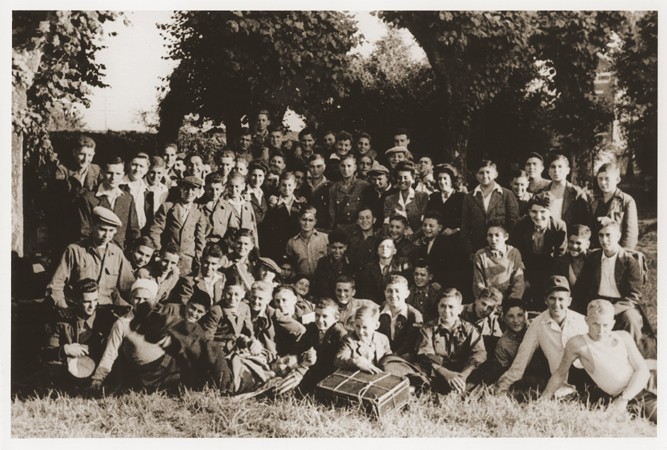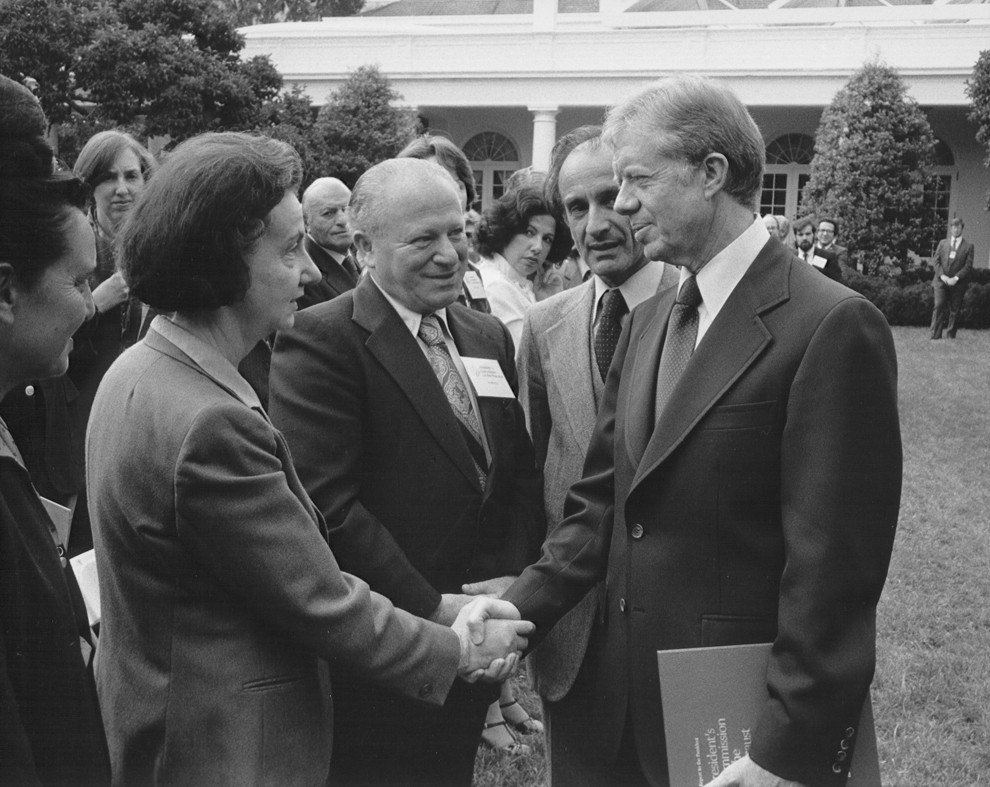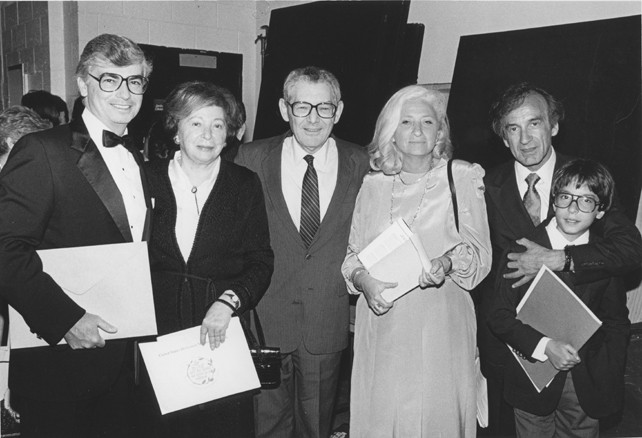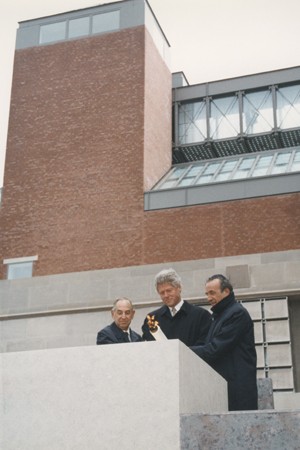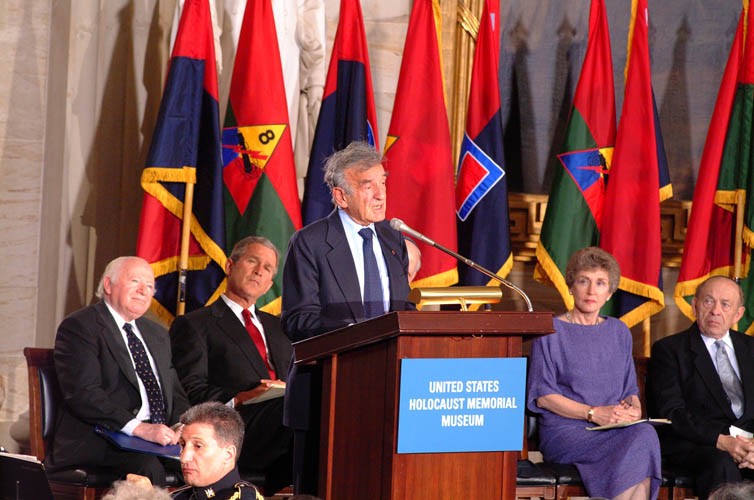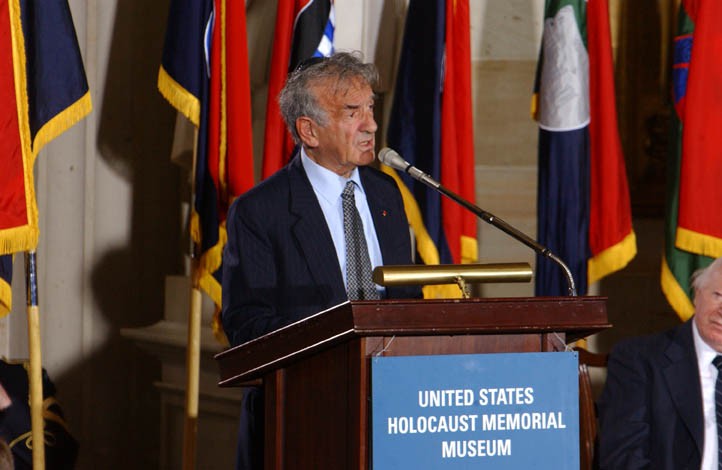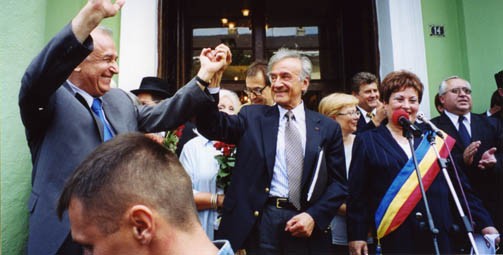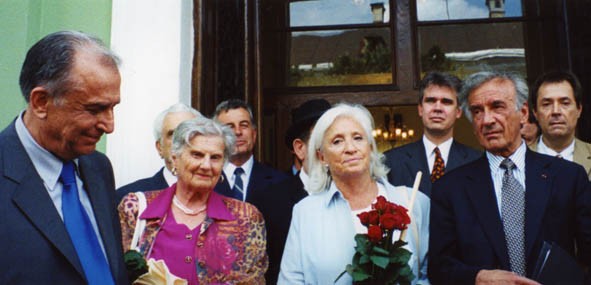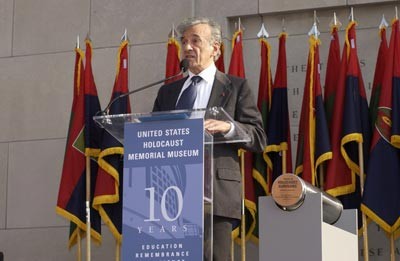
Elie Wiesel
Elie Wiesel. Auschwitz survivor. Author of Night. Human rights activist. Wiesel devoted his life to educating the world about the Holocaust. He was awarded the Nobel Peace Prize in 1986.
Key Facts
-
1
Elie Wiesel was deported to Auschwitz with his family in May 1944. He was selected for forced labor and imprisoned in the concentration camps of Monowitz and Buchenwald.
-
2
After the war, Wiesel advocated tirelessly for remembering about and learning from the Holocaust. He was a driving force behind the creation of the United States Holocaust Memorial Museum.
-
3
In 1986, Elie Wiesel was awarded the Nobel Peace Prize for his efforts to defend human rights and peace around the world.
Never shall I forget that night, the first night in camp, that turned my life into one long night seven times sealed.
Never shall I forget that smoke.
Never shall I forget the small faces of the children whose bodies I saw transformed into smoke under a silent sky.
Never shall I forget those flames that consumed my faith forever.
Never shall I forget the nocturnal silence that deprived me for all eternity of the desire to live.
Never shall I forget those moments that murdered my God and my soul and turned my dreams to ashes.
Never shall I forget those things, even were I condemned to live as long as God Himself.
—Excerpt from Night by Elie Wiesel
Who was Elie Wiesel?
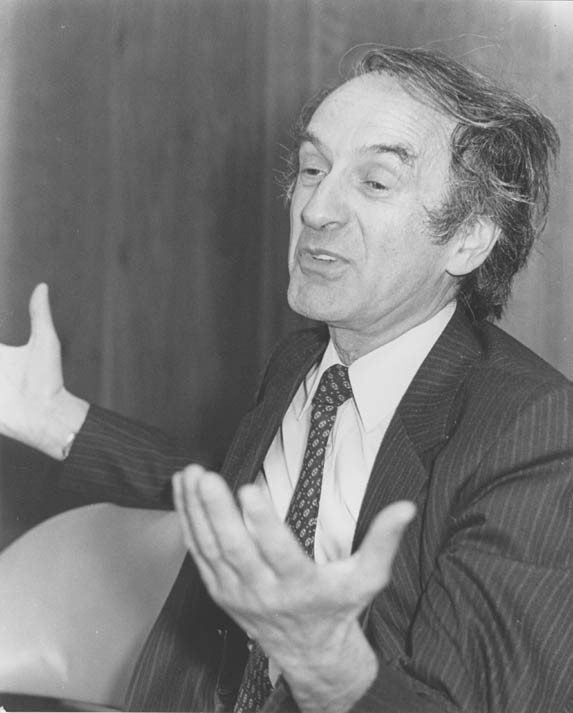
Elie Wiesel (1928–2016) was one of the most famous survivors of the Holocaust and a world-renowned author and champion of human rights. His first book, Night, recounts his suffering as a teenager at Auschwitz and has become a classic of Holocaust literature. In 1986, he was awarded the Nobel Peace Prize.
Wiesel was born on September 30, 1928, in Sighet, Transylvania (Romania, from 1940–1945 part of Hungary). In 1944, he and his family were deported to Auschwitz. Only he and two of his three sisters survived the Holocaust.
After World War II, Wiesel became a journalist, prolific author, professor, and human rights activist. He was Distinguished Professor of Judaic Studies at the City University of New York (1972–1976). In 1976, he became the Andrew W. Mellon Professor in the Humanities at Boston University, where he also held the title of University Professor. During the 1982–83 academic year, Wiesel was the first Henry Luce Visiting Scholar in the Humanities and Social Thought at Yale University.
Wiesel advocated tirelessly for remembering about and learning from the Holocaust. He was a driving force behind the creation of the United States Holocaust Memorial Museum. His own experience of genocide drove him to speak out on behalf of oppressed people throughout the world. The Nobel Committee awarded him the peace prize "for being a messenger to mankind: his message is one of peace, atonement and dignity."
Elie Wiesel died on July 2, 2016, at the age of 87.
Elie Wiesel’s Imprisonment during the Holocaust
In March 1944, Nazi Germany occupied its ally Hungary. Between May 15 and July 9, 1944, Hungarian officials in cooperation with German authorities deported nearly 440,000 Jews primarily to Auschwitz, where most were killed. Among the first to be deported were the Jews of Sighet, including Wiesel, his parents, and his three sisters. He was 15 years old.
The Wiesel family was sent to Auschwitz-Birkenau, which served as both a concentration camp and a killing center. When the family arrived, Wiesel’s mother Sarah and younger sister Tzipora were selected for death and murdered in the gas chambers. His two older sisters, Beatrice and Hilda, were selected for forced labor and survived the war.
Wiesel and his father Shlomo were also selected for forced labor. Wiesel was assigned to work in the Buna (synthetic rubber) factory in Auschwitz III (Monowitz). He and his father were later transported from Auschwitz to Buchenwald, where his father died.
Wiesel’s First Book: La Nuit (Night)
After the war, Wiesel studied in Paris and eventually became a journalist there. For almost a decade, he remained silent about what he had endured as an inmate in the Auschwitz and Buchenwald camps. During an interview with the French writer François Mauriac in 1954, Wiesel was persuaded to end that silence. He subsequently wrote La Nuit (Night). Since its publication in 1958, La Nuit (Night) has been translated into 30 languages and millions of copies have been sold.
In Night, Wiesel writes about his experiences at the hands of the Nazis during the Holocaust. Among other things, he describes:
- the roundup of his family and neighbors in the Romanian town of Sighet;
- deportation by freight car to the concentration camp Auschwitz-Birkenau;
- the selection process during which his mother and younger sister were chosen for immediate death in the gas chambers;
- the same selection process during which he, his father, and his two other sisters were chosen for forced labor by camp personnel;
- the death march from Auschwitz-Birkenau to the concentration camp at Buchenwald.
In addition, Wiesel describes the mental and physical anguish he and his fellow prisoners experienced as they were stripped of their humanity by the brutal camp conditions. He also writes about his spiritual struggles and crisis of faith.
Elie Wiesel as Author
Wiesel was a prolific writer and thinker. In addition to Night, he wrote more than 40 books for which he received a number of literary awards, including:
- the Prix Medicis for A Beggar in Jerusalem (1968)
- the Prix Livre Inter for The Testament (1980)
- the Grand Prize for Literature from the City of Paris for The Fifth Son (1983)
His writings also include a memoir written in two volumes. The first volume is entitled All Rivers Run to the Sea (1995). The second is entitled And the Sea is Never Full (1999).
Elie Wiesel as Human Rights Activist
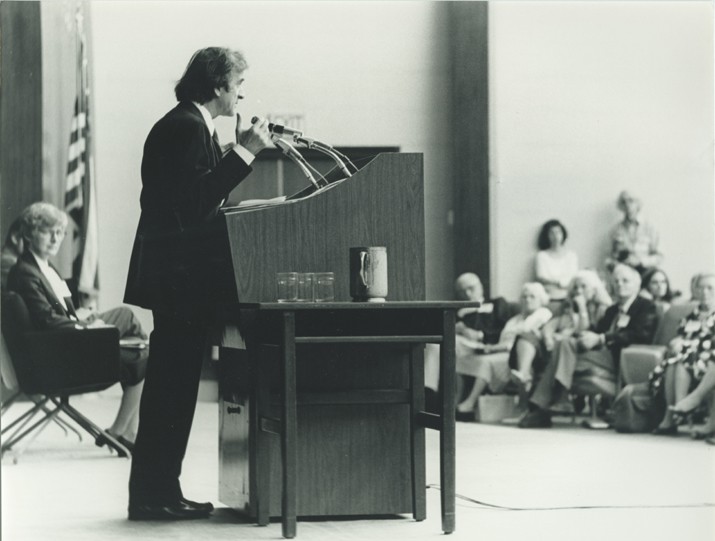
In 1978, President Jimmy Carter appointed Wiesel as Chairman of the President's Commission on the Holocaust. Wiesel wrote the Commission’s report, which recommended that the United States government establish a Holocaust memorial and museum in Washington, DC.
In 1980, Wiesel became Founding Chairman of the United States Holocaust Memorial Council, which was responsible for carrying out the Commission’s recommendations. Wiesel believed that the United States Holocaust Memorial Museum should serve as a “living memorial” that would inspire present and future generations to confront hate, prevent genocide, and promote human dignity.
In 1992, Wiesel became the founding president of the Paris-based Universal Academy of Cultures, a human rights organization.
Wiesel's efforts to defend human rights and peace throughout the world earned him the Presidential Medal of Freedom, the United States Congressional Gold Medal and the Medal of Liberty Award, and the rank of Grand-Croix in the French Legion of Honor. He received more than 100 honorary degrees from institutions of higher learning.
In 1986, Elie Wiesel was awarded the Nobel Peace Prize. In a press release, the Nobel Committee described Wiesel as follows:
Wiesel is a messenger to mankind; his message is one of peace, atonement and human dignity. His belief that the forces fighting evil in the world can be victorious is a hard-won belief. His message is based on his own personal experience of total humiliation and of the utter contempt for humanity shown in Hitler’s death camps. The message is in the form of a testimony, repeated and deepened through the works of a great author.
Three months after he received the Nobel Peace Prize, Elie Wiesel and his wife Marion established The Elie Wiesel Foundation for Humanity. Its mission is to advance the cause of human rights and peace throughout the world by creating a new forum for the discussion of urgent ethical issues confronting humanity.
The Elie Wiesel Award
The Elie Wiesel Award is awarded annually by the United States Holocaust Memorial Museum. The award recognizes internationally prominent individuals whose actions have advanced the Museum’s vision of a world where people confront hatred, prevent genocide, and promote human dignity. Established in 2011 as the United States Holocaust Memorial Museum Award and renamed for inaugural recipient Elie Wiesel, it is the Museum’s highest honor.
Frequently Asked Questions
Did Elie Wiesel find his sisters?
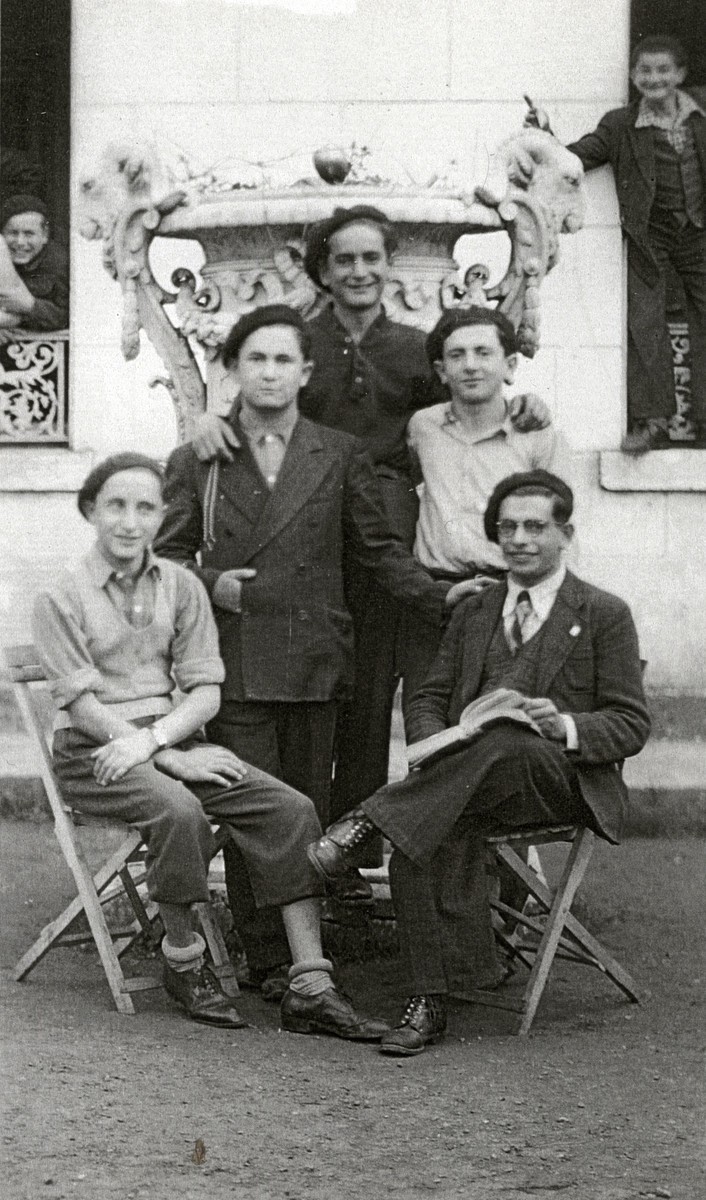
Wiesel reunited with his older sisters, Beatrice and Hilda, following liberation. After the war, Wiesel was first sent to children’s homes in France, where he was photographed. Hilda saw her brother’s image in a newspaper, and the pair reunited in Paris. Several months later, they learned that Beatrice had also survived. Wiesel’s younger sister, Tzipora, was murdered at Auschwitz.
Did any of Elie Wiesel's family survive?
Wiesel’s older sisters, Beatrice and Hilda, survived. His parents, Sarah and Shlomo, and younger sister, Tzipora, were killed.
When did Elie Wiesel die?
Elie Wiesel died on July 2, 2016, at the age of 87.
Why did Elie Wiesel win the Nobel Prize?
Elie Wiesel was awarded the Nobel Peace Prize for his efforts to defend human rights and peace around the world. In 1986, the Nobel Committee wrote, “Wiesel is a messenger to mankind; his message is one of peace, atonement and human dignity.”
How old was Elie Wiesel at the end of Night?
Elie Wiesel is 16 years old at the conclusion of Night.
What were all of the concentration camps Elie Wiesel went to?
Wiesel was deported to Auschwitz-Birkenau in May 1944. He was then sent to forced labor at Auschwitz III, also called Monowitz, located several miles from the main camp. In January 1945, Wiesel was transported to the Buchenwald concentration camp.
How did Elie Wiesel describe his belief in God before and after the Holocaust?
Elie Wiesel reflected on his relationship with God in writings, speeches, and interviews. He opens his memoir Night by writing about his devout faith and religious education as a young boy. As he witnesses the inhumanity of Auschwitz in Night, Wiesel explains that he began to question God. More than 50 years after liberation, he reflected on this: "What about my faith in you, Master of the Universe? I now realize I never lost it, not even over there, during the darkest hours of my life."
Footnotes
-
Footnote reference1.
Elie Wiesel, The Night Trilogy: Night, Dawn, Day, trans. Marion Wiesel (New York: Hill and Wang, 2006), p. 52.
-
Footnote reference2.
"The Nobel Peace Prize for 1986," NobelPrize.org, Nobel Media AB 2021, accessed March 15, 2021, https://www.nobelprize.org/prizes/peace/1986/press-release/.
-
Footnote reference3.
Elie Wiesel, "A Prayer for the Days of Awe," The New York Times, October 2, 1997, https://www.nytimes.com/1997/10/02/opinion/a-prayer-for-the-days-of-awe.html.
Critical Thinking Questions
How did Elie’s early life shape his postwar goals and accomplishments?
Read one of Wiesel’s works besides Night. How was the story, tone, and approach different or similar?
Explore the many legacies of Elie Wiesel. Which part of Wiesel’s legacy is most powerful or important for you?


